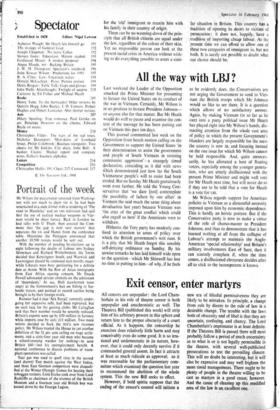Exit censor, enter martyrs
All censors are unpopular: the Lord Cham- berlain in his role of theatre censor is both unpopular and anachronistic as well. The Theatres Bill (published this week) will strip him of his arbitrary powers in this sphere and return him to the proper obscurity of a court official. As it happens, the censorship he exercises does relatively little harm and may conceivably even do some good. It is so irra- tional and undemocratic in its nature, how- ever, that it could only decently survive if it commanded general assent. In fact it attracts at least as much ridicule as approval; so it was reasonable for the parliamentary com- mittee which examined the question last year to recommend the abolition of the whole system. This the new Bill seeks to effect.
However, if bold spirits suppose that the ending of the censor's control will initiate a new era of blissful permissiveness they are likely to be mistaken. In principle, a change from rule by decree to the rule of law is a desirable change. The trouble with the laws both of obscenity and of libel is that they are uncertain, confusing, and chancy. The Lord Chamberlain's imprimatur is at least definite. If the Theatres Bill is passed there will most probably follow a period of much uncertainty as to what is or is not legally permissible in the theatre, with several well-publicised prosecutions to test the prevailing climate. This will no doubt be interesting, but it will also be expensive and may well frighten the more timid managements. There ought to be plenty of people in the theatre willing to be cast as martyrs in a good cause, however. And the cause of cleaning up this muddled area of the law is an excellent one.


































 Previous page
Previous page